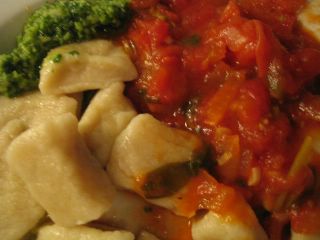
patriotic potato dumplings arrange themselves an the italian style ...
this is a blog about a failed recipe and the key to success that was provided through science. for that reason, i'm going to turn the game around and consider the science behind gnocchi before we look at the recipe. the science is pretty straightforward (although i know that only now) ...
we are basically making the gnocchi from starch. in this case, we are using the starch of the potato (its energy stores) as the supply. we obviously need something to hold the starch together into little dumplings. we use flour to provide gluten (you will recall that the egg also acts as a toughener). essentially, the process going on here is very similar with the process involved in short-crust pastry. the secret to great tasting gnocchi is therefore in balancing the tougheners (flour, egg white and water) with the tenderisers (fat and egg yolk) ...
there are many types of gnocchi; potato (most starchy vegetables), flour, semolina ricotta, spinach or breadcrumbs. potato are the most traditional and the type that we make here. the recipe that we used was as follows (i'm not going to credit this source as later i discredit it):
- 225g plain flour
- 2 small eggs
- 900g potatoes
- sea salt
- 55g butter
- parmesan
the instructions are deceptively simple... cook the potatoes in boiling water. peel and rice when cooked. sieve the flour and mix the egg from within a well. add the potato and knead until soft. roll into a cylinder about an inch thick. cut into 1 inch long pieces. use your finger to fold towards you so that the gnocco can hold the sauce. cook approx 20 at a time for approximately 2-3 minutes. serve immediately.

so, where did it go wrong? i had quite a few problems with the above method. the dough turned out to be quite sticky. as a result we had to add extra flour. rolling was still difficult, but somewhat more manageable. when cooked the dumplings turned out quite hard and tasted a little too floury.
claudi roden, in the great "the food of italy" says that she found gnocchi difficult to make at first. often they fell apart when cooking or tasted of flour (bells ring). she gives a different recipe:
- 800g potatoes
- salt
- 2 egg yolks
- 100g plain flour
you can immediately see that there is less flour and only egg yolks used here. how does she do this? well, she selects and cooks the potatoes in such a way as to ensure that the minimum amount of toughener is required ...
- mature baking potatoes (e.g. russet) should be used. these are more mealy than waxy; dryness and starch increase with aging. they have less water and more flour & starch; hence less flour required.
- she recommends baking the potatoes for an hour rather than boiling. the reason for this is to minimise the amount of water that is incorporated into the potato. again, less flour is required and as a result less gluten is formed and the dumplings will be more tender.
there are some other techniques that may be employed aimed at ensuring that as little moisture remains in the potato as possible:
- don't peel or cut the potatoes
- rice the potatoes in order to let the moisture escape
a perfect outcome of the above is that the egg may not even be required (removing another toughener). you will end up with gnocchi dough that is neither sticky nor floury and will make natural tasting dumplings.
... not that i was out of the woods with the above, blanca gave me my first "free cooking" test. basically, putting together pesto without any instructions. the recipe that we used was:
- 4 cloves of garlic
- pinenuts
- basil
- olive oil
- pepper & salt
- parmesan

pesto is really just a vegetable puree. it was traditionally made in a mortar and pestle (hence the name). i used the magimix for my attempt. it worked out quite well although the taste of basil was somewhat diminished. this may be due to the fact that the leaves will lose their taste the smaller they are chopped (perhaps i should have used a pestle?), but i need to verify this ... for another day ...




No comments:
Post a Comment